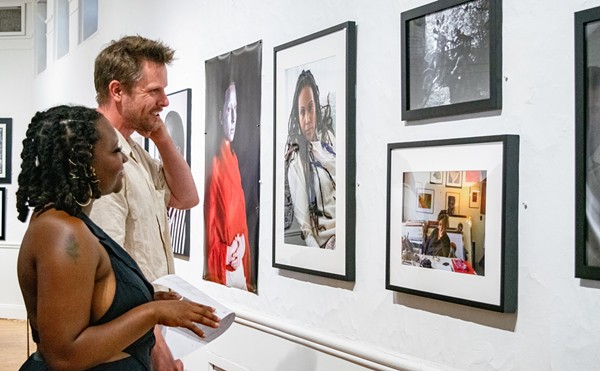Jayne DePotter and Jaclyn Piscitelli run Franklin's metalsmithing and jewelry making school, Fritz and Friends. Tucked behind a short row of stores off Franklin Road in the darling community of rolling hills, grassy lawns, and tall, tall trees, the little shop hosts lessons and workshops for locals who are interested in getting something of an alternative education.
Ten-week classes run about $280 without materials, and the courses teach the basics. Students can receive a continual education through the shop's never-ending advanced classes. We stopped by the studio for a quick chat with the very friendly DePotter and Piscitelli and got a crash course in what it means to learn to mold metals.
Metro Times: How did each of you get started in metalsmithing?
Jayne DePotter: I started taking classes here. I lived in Japan for five years and got my teaching certificate in ikebana, Japanese flower arranging. I came home and I wanted to do more, but I couldn't find anyone who could teach me because my teaching certificate was at too high of a level. So I was like, "Now what am I gonna do?" My sister-in-law said "Oh, I heard about this place called Fritz Willis." So, we started taking classes here. I would leave here with knots in my shoulders and with the worst headache because I was used to ikebana, where it's very quiet and all you hear is the "snip-snip" of your scissors, and it's all very zen. It took me a while, but I love it. I continued to take classes here for about eight years and then Becky and Barb, the previous owners, decided to move on. It started with seven of us students who decided that we didn't want it to end. Since then, it dwindled down to two, just my partner and myself. Then she decided to leave so we brought in Jaclyn. She was one of our favorite beginner students that we ever had and so we brought her in as a partner.
Jaclyn Piscitelli: I got my bachelor's degree in architecture, and I worked in the field for a while until the market crashed. Then I went back and got a degree in education and was working in Detroit schools for a while. Things just weren't working out at my school. And so I'd been taking classes here, and the opportunity came up, and I really wanted to get back into something more creative. I figured I could use my architecture and education background. It's been a few months now since I became partner. We've done a bunch of workshops, and I got to teach my first workshop this summer. I'll be teaching beginner classes in the fall.
MT: What's the difference between classes and workshops?
Piscitelli: The workshops are way more focused. For instance, we've done fold-forming bracelets. You're really focusing on one thing and really teaching them how to do every step of that bracelet, whereas when you're taking classes you're learning several different techniques and working on multiple projects.
DePotter: In our beginner curriculum, we teach A to Z, and it's designed to touch every tool in the studio except for two major ones, but you get to the soldering station, you're at the drill press, you're pounding, so you learn how to use every tool. Then they go to an intermediate program where they learn to use those other tools. In the next 10 weeks, they go to advanced, and by then they know everything, and we can trust them with tools. The beginner curriculum and the intermediate curriculum always stay the same, but the advanced curriculum we switch up every 10 weeks. We're going to be doing stone-setting coming up in September. Last time we did lockets and cold connections. We've done married metal.
MT: Once people finish the advanced program, where do they go from there?
DePotter: People can take the advanced course over and over again because we're always changing the curriculum. We have advanced students that have been here the whole 26 years that the studio has been open.
MT: Do the classes come with the metals or are those purchased in addition to the class cost?
Piscitelli: In the beginning, they can use our tools, and then they're encouraged to get their own. But when I started, I literally went out and bought everything, every weekend I was buying something new. You get into it, and you want those things for yourself.
DePotter: They have to have their own saw and their own file. We've tried to condense that materials list down so it's not such a huge investment, because it was running about $120 or so to buy the tools, so I think we've condensed it down to about $80.
MT: Are these classes a gateway to more education in metalsmithing?
DePotter: People take the class and then they can decide if they want to go to school for it. They take a couple sessions and decide this is something they do like and want to pursue. Also, we take high school students who've exhausted their curriculum in school and we give them a discount.
Piscitelli: We had a student a couple sessions ago who was taking a break from college and she wanted to get into metalsmithing again, so she came here and was trying to brush up on her skills in order to start a business. I don't think she was really interested in going back to school. If you have a talent for something, you can get an education in a lot of different settings. Here you can really get a good education. You learn a lot.
MT: Do you find people go on to explore different sides of metalsmithing outside of jewelry making?
Piscitelli: If they're trying to do things on a bigger scale, then they definitely will go to places like Smith Shop (in Detroit) to learn welding and things that we don't offer here. But I think this offers a good base for people who are interested and want to get their feet wet. It's an investment of time and money, so you really have to want it. I think this is a great place, because it really shows a whole new world of things and teaches you to be hands-on. But not everyone is going to love that. So, for a kid who's going to school, or thinking about going to college, that's a huge investment. Places like this are really good for kids that are that age, to explore before they take that bigger step and pay that kind of money for a couple college credits.





